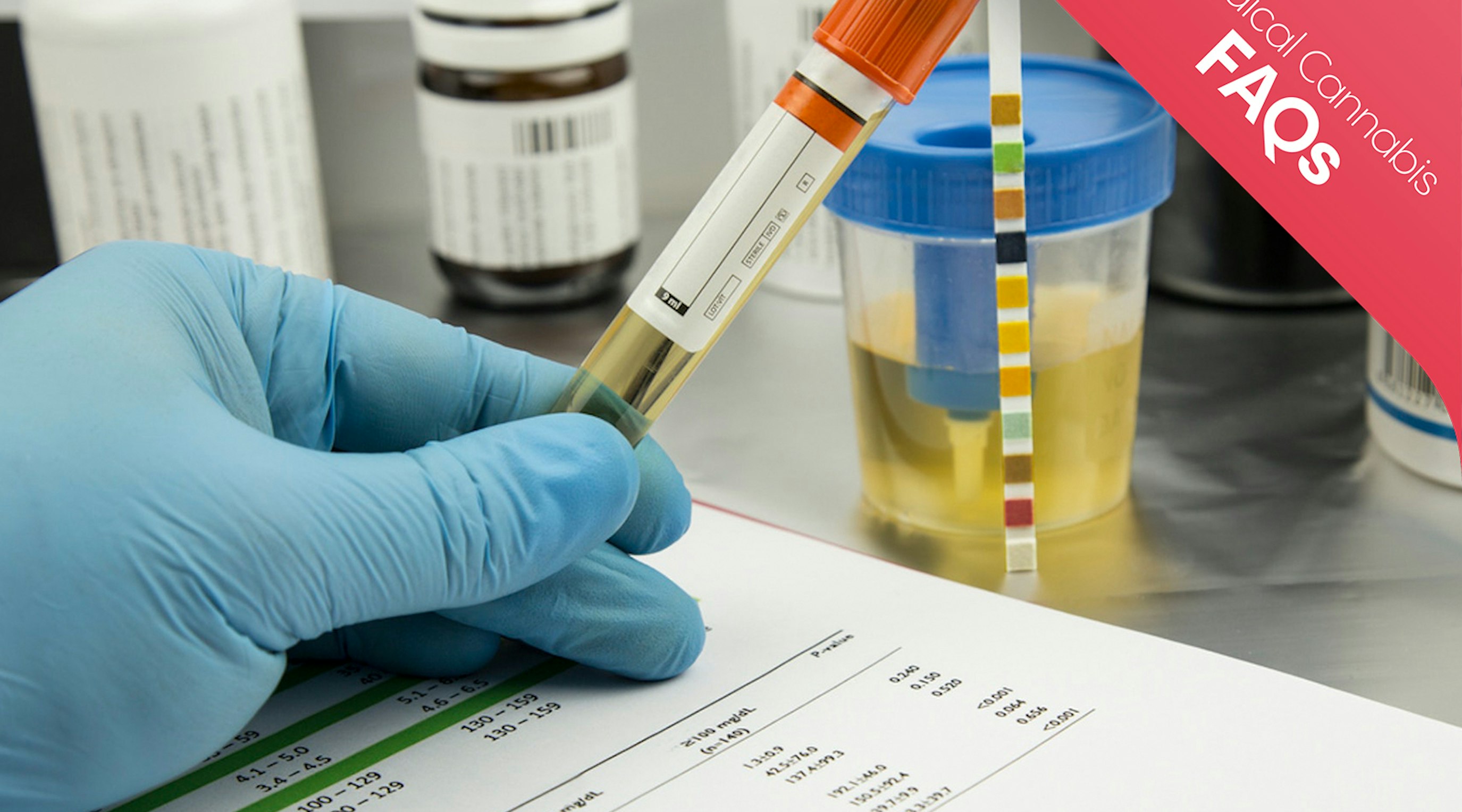How long does cannabis stay in your system?
10 min read
Editorial Team
Cannabis stays in your system for anywhere between three and 90 days. There are multiple factors that will influence if cannabis is detectable in the body including the type of test, the method of ingestion, the dose, and the tested individuals' metabolism.
Tests are designed to show the presence of THC or THC metabolites depending on the type of sample being analysed. Having THC or traces of past use of THC in your system does not imply you are impaired. Let’s take a look in more detail to understand the nuance.
Contents
How long does cannabis stay in your saliva?
A basic test to detect if there is THC present in someone's system is by analysing their saliva. This is done by inserting an absorbance pad into the mouth which wicks up the saliva in someone’s mouth. The pad with the saliva is then put into a solution requiring you to wait for the reaction.
Once enough time has passed markers on a PCR indicator will show if there is THC present. It will show if THC has been used within the last 8 hours but may still show a positive reading up to 24 hours. These kits work in a very similar way to COVID tests. These tests are fairly accurate but can provide false readings both ways. They do not tell you how much THC is in someone's system, only that it is there.
How long does cannabis stay in urine?
Another way to test to see if cannabis has been in the system is by urinalysis. Someone's urine can be collected and using a PCR test it will determine if the person has used THC. These tests are measuring a secondary metabolite THC-COOH (11-Nor-9-carboxy-THC) which is present as a result of cannabis use as long as 90 days ago, due to the way cannabinoids are stored in body fat and slowly released as fat is broken down.
How long does cannabis stay in blood?
To get the most accurate reading of the level of active THC metabolites in someone's system a blood test can be conducted. Using a hypodermic needle blood is withdrawn from the body. This analysis will determine the precise number of nanograms in THC per litre blood in the person. THC can be detected in the blood for around 12 hours after use but can be detected after longer periods including 24 hours.
How long does cannabis stay in hair?
The last way that the body can be examined to determine if cannabis is in the system is by testing the hair. New hair growth can show THC use from as far back as 90 days prior to testing. The THC that is detectable in hair will remain there until it is cut.
How do cannabinoids get into the bloodstream?
Cannabinoids get into the bloodstream through inhalation or oral ingestion. When cannabis or THC is taken orally it is processed by the digestive acids and passes through the liver before entering into the bloodstream. The onset of effects take around 45 minutes to an hour. Taking it with food can improve bioavailability and higher fat foods further increase bioavailability. Inhaled cannabinoids can enter the bloodstream in a matter of seconds allowing the effects to be felt almost instantly.
What factors impact how long cannabis stays in your body?
The factors that impact how long cannabis stays in your system depend on the individual, their body type, body fat stores, how they took cannabis, how much and how strong it was.
- Body Fat - because cannabinoids are fat soluble they bind easily to the fats in your body. The more fat stores you have, the greater chance your body has of holding onto cannabinoids for longer.
- Frequency and Quantity of Use - using cannabis frequently will create an overlap of the THC metabolites stored in your system as there will be less time for them to clear.
- Potency - the more THC someone takes, the longer it takes for it to leave the body due to greater amounts being stored in the fat.
- Method of use - Oral use of cannabis causes THC to pass through the liver which is metabolised into other forms of THC which can cause more to store in the body fat than if THC is inhaled where it goes directly into the bloodstream.
How long does THC stay in your bloodstream?
THC stays in your bloodstream for a sustained period of time. THC’s journey through the body is long and slow. As we have already explored, cannabinoids are fat soluble which the body readily holds onto. 80 minutes to 2 hours after taking THC, the metabolite THC- COOH and its glucuronide THC-COOH-gluc levels in the blood reach maximum levels where they remain for several days.
THC is metabolised relatively quickly and is converted efficiently or passed in urine or faeces. THC can be detected in blood tests anywhere up to 24 hours but the possibility of THC-COOH showing in your blood could last as long as the metabolite stays in the fat - up to 30 days but potentially as long as 90 days.
What is THC’s half-life?
THC’s half-life is calculated at around 20-30 hours. 11-hydroxy-THC has a similar half-life of around 12-36 hours with it being longer in heavier users. Half-life is the time it takes for half of the drug to leave the system. Typically, the body will eliminate a drug within four to five half-lives.
How long does CBD stay in your bloodstream?
The more CBD you take in a single dose, the longer it stays in your system. A study in the journal Therapeutic Drug Monitoring found taking 1.35 milligrams of CBD was detectable in the blood for around six hours after being taken, but higher doses were detected for longer.
What is CBD’s half life?
The half-life of CBD, or cannabidiol, varies depending on several factors, including the method of ingestion and the individual's metabolism. Generally, the half-life of CBD is estimated to range from about 1 hour to as long as 5 days.
- Taking CBD Orally: When CBD is consumed orally on an empty stomach, it tends to have a shorter half-life. This is because it gets processed by the digestive system and metabolised by the liver relatively quickly.
- Influence of Food: Consuming CBD with food, especially fatty foods, can extend its half-life. Fats enhance the bioavailability of CBD, which means that more of it is absorbed into the bloodstream. As a result, it takes longer for the body to process and eliminate CBD, thereby increasing its half-life.
Medical cannabis FAQs
How does medical cannabis affect our bodies?
Medical cannabis influences our body by interacting with the endocannabinoid system (ECS), a complex cell-signalling system that plays a key role in regulating a range of functions and processes, including sleep, mood, appetite, memory, and pain.
It has been shown to help with a huge range of health concerns. Medical cannabis has been a legal treatment option in the UK since 2018, and can be prescribed (through a private clinic like Releaf) for almost any condition as long as the prescribing specialist believes it will benefit you.
What is the difference between medical cannabis and recreational cannabis?
The main difference between medical cannabis and recreational cannabis is the purpose for which it is used. Medical cannabis is prescribed by a doctor to treat specific health conditions, while recreational cannabis is typically used for leisure or social purposes.
Here in the UK, recreational cannabis remains illegal, while medical cannabis is legal under specific circumstances.
How should I take my first dose of medical cannabis?
There is no 'one-size-fits-all' approach to taking medical cannabis. The best method and dosage will depend on your individual needs and the condition being treated. Your prescribing specialist will work with our multidisciplinary team to create a personalised treatment plan that suits your specific needs.
In most cases, patients are recommended to 'start-low, go-slow' when taking medical cannabis for the first time. This means starting with a low dose and gradually increasing it until you achieve the desired therapeutic effects.
Should I take my prescription at a certain time of day?
As above, there is no universal answer to this question. Your prescribing specialist may recommend taking your medication at a certain time of day based on factors such as the condition being treated and the type of medical cannabis being prescribed.
What quantity and cultivar of medical cannabis is right for me?
UK medical cannabis patients are blessed with a wide range of cultivars (strains) and formulations to choose from. Your prescribing specialist will be able to advise on the most suitable option for your needs, but it may involve some trial and error to determine the right cultivar, dose, and method of administration for optimal relief.
How long does edible CBD stay in the system?
Edible CBD typically stays in your system for 2 to 5 days, though the actual time frame will vary based on how often you take CBD, the dosage, your metabolism, and body weight. Patients taking CBD in small doses daily, for example, may have CBD traces stay in the system longer than someone who takes a higher dose once a week.
How long does it take for a drug to be eliminated from the body?
That depends on the drug, how often it is taken, and a range of other factors. Most drugs stay in the system for a few days, with some (like medical cannabis) being detectable for up to several weeks if taken regularly. Hair, urine and blood tests will show results for far longer than a mouth swab or saliva test.
Conclusion
In summary, the duration that cannabis components like THC and CBD stay in your system can vary widely, influenced by a myriad of factors such as the type of test used, the method of ingestion, dosage, and individual metabolism. The article offers a detailed look into various testing methods—ranging from saliva and urine to blood and hair tests—each with its own time frame for detection. Understanding these nuances is crucial for both medical and recreational users of cannabis, as well as employers and healthcare providers who may require this information for testing purposes.
Accessing medical cannabis can be challenging due to the stigma surrounding it. However, Releaf makes it simple with our tailored monthly packages, specialist consultations for medical cannabis, and a unique medical cannabis card for protection, all based on your cannabis prescription.
Want to learn more?
Visit our blog and education pages, packed with valuable information for patients and anyone interested in cannabis-based medicines. Follow us on Instagram and LinkedIn for the latest updates on UK medical cannabis.
Share article
Did you like this article?
It is important to seek medical advice before starting any new treatments. The patient advisors at Releaf are available to provide expert advice and support. Alternatively, click here to book a consultation with one of our specialist doctors.
Elevate your wellness with medical cannabis
Get comprehensive care, convenience, and confidence with an all-in-one treatment plan.
Am I eligible?Authors
Editorial Team
Article written by the Releaf Editorial Team, a group of seasoned experts in cannabis healthcare, dedicated to enhancing awareness and accessibility in the field through their wealth of knowledge and experience.
fact checked
Compliance Director
Editorial Policy
All of our articles are written by medical cannabis experts, guided by strict sourcing guidelines, and reference peer-reviewed studies and credible academic research. Our expert clinical team and compliance specialists provide valuable insights to ensure accuracy when required. Learn more in our editorial policy.
Need more help?











